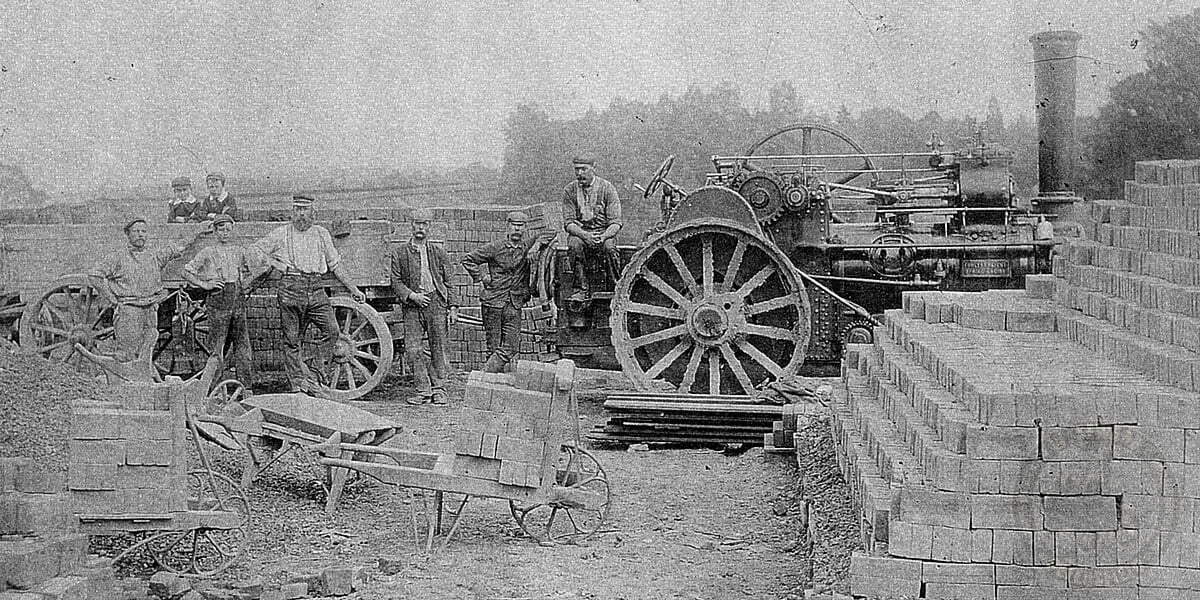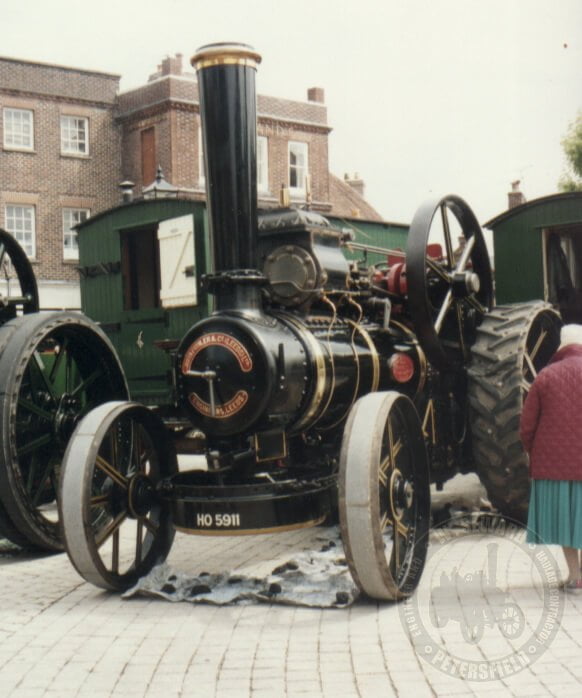
Walter Seward took delivery of a 6hp Fowler compound agricultural number 7453 in 1895. When he ordered the engine, he specified it to be built as light as possible. This instruction was carried out and the engine was delivered by rail in November of 1895.
According to the records of John Fowler & Co. Leeds, the order for the engine was added to their Stock Order ledger on April 27th 1895. The brief entry states that the engine should be a “Class A4 Compound Agricultural Traction. Hind axle on springs. Brass cap on chimney. Horizontal regulator lever”. It also has an added note “Painted Green. As per sample sent.”
The notes for the actual build of the engine start from the date August 22nd 1895. Below are some of the interesting excerpts from the record.
After using the engine it was found that the Fowler was breaking wheel spokes at an alarming rate, and others were coming loose in the hub. Fowlers were informed and replacement rear wheels were dispatched, but the new items were of a smaller diameter than standard. To this day, the engine retains the very individual appearance given to it by these smaller rear wheels. On the notes from the Fowler works there is an entry for the replacement rear wheels, it reads, “July 9th/03 1 Pair of hind road wheels 5′ – 6″ dia x 1′ – 4″ wide. Bored 4 3/4″ without brake ring.”
The engine was economical and powerful, and used little water and coal compared with other engines. It was often used to pull a threshing drum, elevator and living van up a local hill called “Hawkley Hill” which it attacked successfully non-stop in top gear. This is a hill that is considered steep even today and has a sharp hairpin bend halfway up.
We even have photographic evidence of 7453 being used on haulage duties at the Nightingales Brickworks, The Causeway, Petersfield. A fascinating picture kindly given to us by Derek Leech.
During the 1920’s, threshing was still the backbone of Seward’s business, and the Fowler covered the area between Hindhead, Liss, Hawkley.
7453 was retired in 1933 and spent the years until 1969 being polished, oiled and greased with affection by her owner.

Initial history based on information kindly supplied by Kevin Lockyer from his articles re. Sewards of Petersfield.
| Cookie | Duration | Description |
|---|---|---|
| cookielawinfo-checkbox-advertisement | 1 year | Set by the GDPR Cookie Consent plugin, this cookie is used to record the user consent for the cookies in the "Advertisement" category . |
| cookielawinfo-checkbox-analytics | 1 year | Set by the GDPR Cookie Consent plugin, this cookie is used to record the user consent for the cookies in the "Analytics" category . |
| cookielawinfo-checkbox-functional | 1 year | The cookie is set by the GDPR Cookie Consent plugin to record the user consent for the cookies in the category "Functional". |
| cookielawinfo-checkbox-necessary | 1 year | Set by the GDPR Cookie Consent plugin, this cookie is used to record the user consent for the cookies in the "Necessary" category . |
| cookielawinfo-checkbox-others | 1 year | Set by the GDPR Cookie Consent plugin, this cookie is used to store the user consent for cookies in the category "Others". |
| cookielawinfo-checkbox-performance | 1 year | Set by the GDPR Cookie Consent plugin, this cookie is used to store the user consent for cookies in the category "Performance". |
| elementor | never | This cookie is used by the website's WordPress theme. It allows the website owner to implement or change the website's content in real-time. |
| viewed_cookie_policy | 1 year | The cookie is set by the GDPR Cookie Consent plugin to store whether or not the user has consented to the use of cookies. It does not store any personal data. |
| Cookie | Duration | Description |
|---|---|---|
| _ga | 2 years | The _ga cookie, installed by Google Analytics, calculates visitor, session and campaign data and also keeps track of site usage for the site's analytics report. The cookie stores information anonymously and assigns a randomly generated number to recognize unique visitors. |
| _gat_gtag_UA_962892_1 | 1 minute | Set by Google to distinguish users. |
| _gid | 1 day | Installed by Google Analytics, _gid cookie stores information on how visitors use a website, while also creating an analytics report of the website's performance. Some of the data that are collected include the number of visitors, their source, and the pages they visit anonymously. |
| CONSENT | 2 years | YouTube sets this cookie via embedded youtube-videos and registers anonymous statistical data. |
| Cookie | Duration | Description |
|---|---|---|
| VISITOR_INFO1_LIVE | 5 months 27 days | A cookie set by YouTube to measure bandwidth that determines whether the user gets the new or old player interface. |
| YSC | session | YSC cookie is set by Youtube and is used to track the views of embedded videos on Youtube pages. |
| yt-remote-connected-devices | never | YouTube sets this cookie to store the video preferences of the user using embedded YouTube video. |
| yt-remote-device-id | never | YouTube sets this cookie to store the video preferences of the user using embedded YouTube video. |
| yt.innertube::nextId | never | This cookie, set by YouTube, registers a unique ID to store data on what videos from YouTube the user has seen. |
| yt.innertube::requests | never | This cookie, set by YouTube, registers a unique ID to store data on what videos from YouTube the user has seen. |
| Cookie | Duration | Description |
|---|---|---|
| __EC_TEST__ | session | No description |
| m | 2 years | No description available. |
| wp_woocommerce_session_716e81fcdb8768cfb357c132b033e0cc | 2 days | No description |